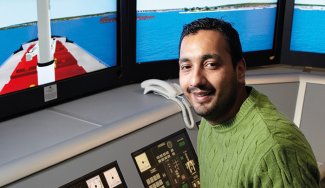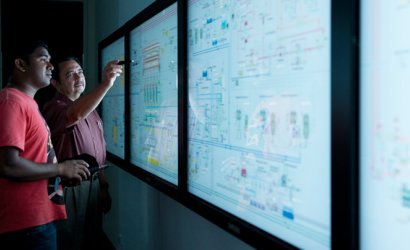

Why choose this course?
Get qualified for a career in the maritime industry with this diploma. During your studies you will participate in a range of essential experiences such as fire fighting in simulated environments, practising water survival skills and rescuing others in distress. As part of your studies you will learn how to tie seaman’s knots and hitches to ships in rough waters.
You will be challenged to develop your ability to lead and manage a crew on any sized vessel. The course includes skills training in instructing the ship's crew on watch keeping, wheelhouse operations, environmental management, routine maintenance, keeping records and logbooks, communications and stability.
This qualification enables you to work as a master or chief mate on vessels less than 500 gross tonnage in any operating area and as watchkeeper deck officer on vessels of any gross tonnage and in any operating area.
With this diploma you are qualified to perform the duties or functions of any of the following:
- a master on ships less than 24 metres (foreign going);
- a chief mate on ships with less than 3000 gross tonnage (GT);
- a watchkeeper deck officer; and
- a watchkeeper deck officer on ships with less than 3000 gross tonnage (GT).
Please note the Maritime calendar differs from the standard TAFE WA semester calendar. Semester dates are stated in your Letter of Offer.
This course is a full-time program that is timetabled over 4 to 5 days per week. This means you will have a very heavy study load which will encroach on your personal commitments during weekdays over the course of the program. The timetabled hours per week are essential to ensure all course requirements are met.
Please also note that certain units may be conducted at an offsite fire ground and sea rescue facility.
Career opportunities
- Watchkeeper Deck
When choosing a course, it's important to think about the key skills and knowledge you'll need, as well as how you'll be assessed. Take a look at this information and consider if you might face any challenges in meeting the course expectations and requirements.
- good time management and the ability to work with tight deadlines
- ability to strictly follow workplace safety standards
- a keen eye for detail
- logical problem solving skills
- good communication skills
- a strong interest in boats, ships and maritime
-
An IELTS score (Academic) of 6.0 with no band score less than 6.0 or equivalent.
-
Equivalent to Australian Year 12.
-
Students must have 36 months of sea time to achieve AMSA certification requirements. Please refer to regulatory requirements licensing information listed under additional information.
-
Students must submit a comprehensive Resume outlining their work experiences, employment history and qualifications in order for the application to be assessed for entry into this course.
Legislative and regulatory requirements are applicable to this qualification. This qualification meets some of the requirements for certification by the Australian National regulatory body the Australian Maritime Safety Authority (AMSA) as a Master of a commercial vessel less than 500 gross tonnage (GT) or Watchkeeper Deck as defined in Marine Orders and the International Convention on Standards of Training Certification and Watchkeeping for Seafarers (STCW).
The AMSA certification of competency will require you to:
- have the MAR50320 Diploma of Maritime Operations - Watchkeeper Deck
- hold or have held certificates of competency as defined in Marine Order 71
- have qualifying sea service as defined in Marine Order 71
- have completed STCW short courses as defined in Marine Order 71
- hold a valid AMSA certificate of medical fitness
- have a final AMSA assessment pass; and
- meet any other regulatory requirements as defined in Marine Order 71.
Seafarers seeking certification should check requirements with AMSA.
There may be further semester intakes available for enrolment. You can view any further intakes when you submit your online application(opens in a new tab).
For information about pathways from TAFE to university, view our Pathways to university page.
How to apply
Apply to study at TAFE in six steps:
- find a course;
- check entry requirements;
- submit an application;
- accept your offer and pay;
- apply for your student visa; and
- receive your visa and come to Australia for your studies.
Build your own course guide
Select the study areas, courses and topics you like. Get your custom guide by email!
Download study area guide(opens in a new tab)
Contact us(opens in a new tab)
TAFE International Western Australia (TIWA) is the Registered Training Organisation (RTO) and Commonwealth Register of Institutions and Courses for Overseas Students (CRICOS) provider, for the delivery of training to international students, enrolled in a TAFE course in Western Australia. This nationally recognised course is delivered by a Western Australian TAFE college on TIWA's behalf. TIWA retains responsibility for the quality of the training and assessment delivered by the TAFE colleges and for the issue of certification documentation to students.


